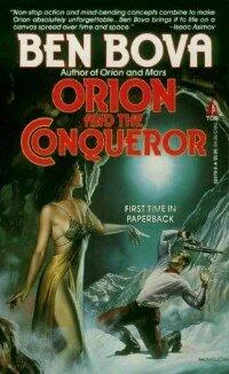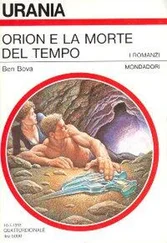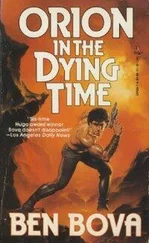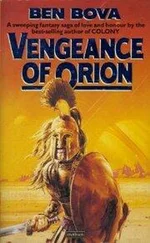“Does Philip intend to rape and plunder Athens and Thebes?”
“No, but they would do it to us.”
“Really?”
“That is what we fear.”
“But those cities lie far to the south. Why are we preparing to make war on them? Why do they want to make war against us?”
“Ah, your questions grow more specific. Good.”
“Well?”
Aristotle got down off his stool and clasped his hands behind his back. He had to look up to see into my face.
“Are you prepared to listen to a lecture on history, Orion?”
I knew from his tone that this would be a long lecture. I nodded. He began to pace. And speak.
The Greeks have never been able to unite themselves, Aristotle said. That is their glory and their weakness. Not since Agamemnon led the Achaians against Troy, countless ages ago, have the Greek cities been able to stand together for more than a few years at a time.
They united briefly, a century and a half ago, when the Persians under the old Dareios invaded Greece as punishment for Athenian support of a rebellion against Persia by the Greek cities on the Ionian coast, across the Aegean from Athens. The Persians were driven off after the Athenians stopped them at Marathon. Ten years later, Dareios’ son Xerxes invaded Greece again with an army that blackened the land with their numbers. Again the Persians were beaten off, even though they sacked Athens itself, because the cities of the south—principally Athens and Sparta—fought side by side against the invaders.
“Both times the Macedonians allowed the Persians to pass through their territory without a fight. They even sold the Persians horses for their cavalry and timber for their ships. Athens has never forgotten that.”
“But that was more than a century ago,” I said.
“Yes, and the Macedonians were little more than a bundle of cattlemen,” said Aristotle. “No match for the power of the Persian Empire. They did not even consider themselves to be Greeks, in the sense that the Athenians did.”
“The Athenians still call the Macedonians barbarians,” I recalled.
Aristotle nodded. “To this day.”
After their second defeat in Greece the Persians decided that these rugged fighters living at the edge of their empire were not worth the trouble to conquer them. But the Great King wanted to keep the rich Ionian cities on the Aegean coast, despite the fact that those cities were as Greek as Athens or Sparta or Thebes.
“Ever since then,” Aristotle continued, “the Persians have meddled in Greek politics. At one time they supported Sparta against Athens. At another, Athens against Corinth. Persian gold has been spent to keep the cities from uniting. Thus the Great King keeps us weak and no danger to his empire.”
“And Philip wants to change that?”
Aristotle smiled, a bit ruefully, I thought. “No man is completely master of his own actions, Orion, not even a king.”
Certainly not me, I knew.
“Philip came to the throne with Macedonia in chaos. The ravening dogs around us were tearing the country to pieces. Our neighbors to the north and the west and the east all invaded Macedonia, seizing whatever they could. No one was safe. Fire and savagery were everywhere. Every man’s hand was raised against us.
“Philip was not the chosen king then. He had to push his own brother off the throne in order to save the country. He united the Macedonians and threw back the invaders. He enlarged the kingdom by conquering those who had invaded us. He has made the Thracians and Illyrians and Molossians and many other warring tribes into allies or outright colonies of Macedonia. He has stretched his power to the edge of the Adriatic Sea, where those primitive tribesmen kill one another for sport. He has expanded his influence into central Greece, where Thebes and Corinth oppose him. For the past several years he has fought a war—sometimes undeclared, but a war nonetheless—against Athens.”
“But why?”
Aristotle’s smile turned knowing. “The Athenians still believe that they are the greatest power among the Greeks. They are loath to allow any other power to become strong enough to challenge them. Encouraged by Persian gold, Athens strives to limit Philip’s power.”
“So that Athens can remain supreme among the Greek cities?”
He nodded. “For his part, Philip believes that he must bend Athens to his will or Athens will destroy Macedonia.”
“Is that the truth?”
“Close enough for Philip. And for Demosthenes.”
“But for you?”
“I see the hand of the Great King behind it all. Like his forebears, this new Dareios fears the power of a united Greece. Philip is the only man who can unite all the Greeks, so young Dareios encourages Athens and the other cities to work against Macedonia.”
“He sees Philip as a threat to the Persian Empire?” I knew that there had been talk from time to time about wresting the Ionian cities from the Persians, but I had taken it to be little more than talk.
Now Aristotle became very serious, even grave. “Orion, it is our destiny to unite the Greeks and conquer the Persians. Unless we do, the Greeks will always be as disunited and quarrelsome as those barbarous Balkan tribes.”
I must have gaped at him. This gnomish philosopher with the weak eyes, this studier of ants and espouser of moral codes, he wanted Philip to make war against the greatest empire in the world.
“And that, in the end, is why men make war upon one another,” said Aristotle. “It is just as natural as a lion chasing down a deer. Kill or be killed. The world must be either one thing or the other. If we do not destroy the Persians they will destroy us.”
I was almost dumbfounded. “But you say that the Persians have tried to destroy Greece for more than a century and a half. They have not been able to do so.”
“Not as yet,” he said calmly. “But what is a century and a half in the affairs of mankind? What is a thousand years? I speak of the long term, Orion, of the ebb and flow of human affairs that takes a thousand generations or more. The Persians can afford to be patient. They have an immense empire and wealth beyond compare. Slowly, slowly they are grinding us down. They paid Sparta to conquer Athens, and when the Spartans became too powerful they paid Thebes to beat down Sparta.”
“And now they play Athens and Thebes against us,” I said.
“Exactly. And every year, every generation, we grow weaker and more tired. Eventually all the Greeks will fall prey to the Persians and we will be swallowed up entirely.”
“Unless we swallow them.”
“Precisely,” he said. “The Greeks and the Persians cannot exist peacefully together. Either we conquer them or they conquer us. There is no other alternative.”
“You are certain of this?”
Aristotle nodded solemnly. “That is what I have trained young Alexandros for. To conquer the world.”
To conquer the world.
Aristotle may have trained young Alexandros to conquer the Persian Empire—which was all the world worth conquering, in his eyes—but to accomplish that, Alexandros needed a united Greece behind him, and only his father Philip could bring all the Greek cities together under Macedonian hegemony. And Olympias, I knew, was scheming to set Alexandros against his father.
“Why?” I asked her, the next time she summoned me to her bed. “Why do you try to make Alexandros hate Philip?”
“You ask too many questions, Orion,” she said, lazily twining her bare arms around my neck.
I put one thumb on her lovely throat. “I want to know.”
Her eyes widened. “You dare to threaten me?”
“I want to know,” I repeated in a whisper, applying a bit of pressure to her windpipe.
One of the pythons slithered up onto my back. I pressed my body close to Hera’s. “Your snake will have to crush us both.”
Читать дальше












